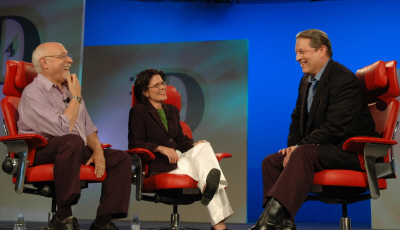D: Al Gore on Current.tv and global warming

Former Vice President and almost President Al Gore discussed his new venture Current TV and global warming with Kara Swisher and Walt Mossberg at D this evening. Asked about why he chose cable TV over a more pure Internet content play for his content venture, Gore said that television is dominant (Americans watch on average 4.5 hours a day), and that people on Internet are watching TV as the same time. Hence, Current TV is on cable TV, and not Internet only, to take advantage of viewing habits. "There is a quasi hypntic trance induced by teleivison,"Gore said, and "people cannot move their thumb muscle to change the station."

He cited digital cameras and laptop editing suites as leveling the playing field in content creation. Thirty percent of video on Current.tv is user contributed, he said. "Distributed computing unlocks the surge of energy to allow individual to democratize the dominant medium of television," Gore said. Walt said that the user contributed programming is also cheaper. Gore responds, "It's better and cheaper." Current.tv also has training for wouldbe videographers.
It's still an open question as to what the audience will be on the large screen compared to the small screen, Gore said. The main sweet spot for television will be on larger screens, he said.
On the subject of global warming, Gore was more energized and credible. He likened global warming apologists to the tobacco lobby, who he said lack moral fiber and scientific rigor, and who contribute to the paralysis of public policy on global warming. "There is no longer any debate about global warming," he said. "The few remaining skeptics get together with those who think the moon landing was staged on a movie lot." Gore is pitching his movie, "An Inconvenient Truth," Davis Guggenheim's documentary about the Vice President's efforts to raise awareness of global warming.
Walt asked Gore why he isn't supporting nuclear power in dealing with the energy crisis. He responded that reactor programs lead to weapons of mass destruction, citing Iran and a proliferation of country with the technology. "If we do not move forward [with nuclear energy], it will less likely be available in other parts of the world," Gore said. "I am not entirely sanguine about the flow of nuclear power," he said, voicing concerns about WMD.
Gore recommended a first step to spread an understanding the current reality. "We have to form a national concensus, and there is a barrier to that. We are in category five denial," he said.
In last 100 years we have quadrupled global population, and improved technology, which has made us the most powerful force of nature, Gore said. The thin shell of atmosphere surrounding the planet is vulnerable, he continued. Coal is plentiful, but the carbon emission have to be captured and disposed of, which has to be made cheaper.
Gore's prescription. He said that leading scientists say we may have ten years before crossing a point of no return, starting an irretrievable process. There is a necessity to sharply reduce CO2 emissions and to find new and renewable sources of energy. The low hanging fruit hanging fruit is conservation and efficiency and in alternative fuels such as cellulose-based ethanol, Gore said.
We have to get back to focusing on genuine value and move away from the pathology of instant gratification in making investments in future technologies, Gore concluded. On the political front, Gore said he encountered difficulty iduring his term in the White House in ratifying the Kyoto treaty, but could only find one senator to vote in favor of it--Paul Wellstone.
"This is a planetary emergency...unlike any other crisis in human history," Gore said. "We are in the process of killing the oceans--the underlying problem is that our civilization is colliding with the ecological system of the planet...we have to take responsibliity for it. If we do not we create a situation that not too many decade from now will ask what were they thinking in 2006...it is a moral and spiritual issue, not a political issue."
Will we act on the knowledge?, Gore asked. "We are lacking the political will, but political will is a renewable resource," Gore concluded.